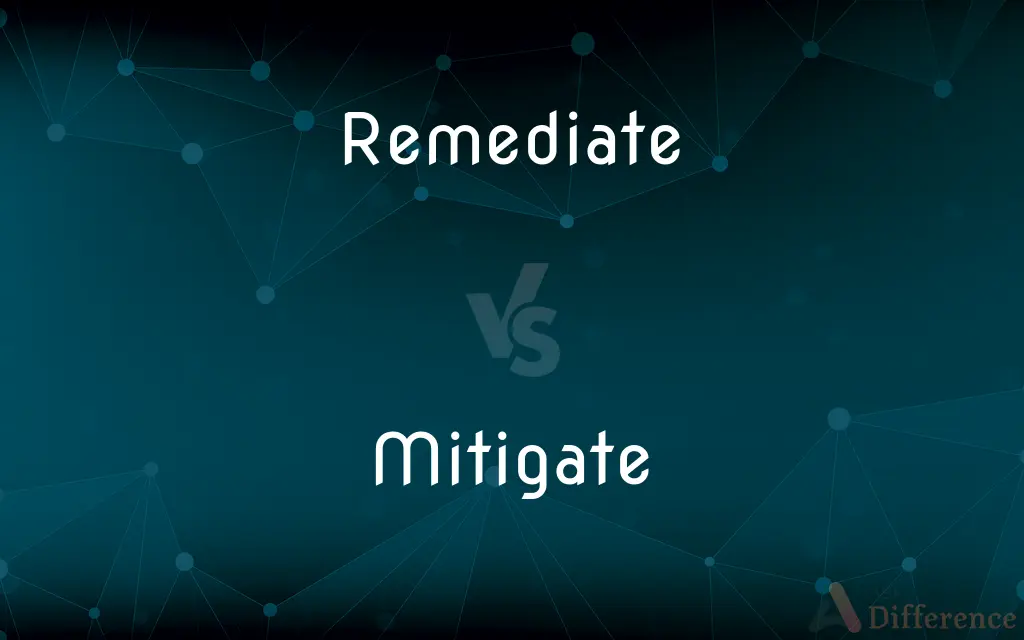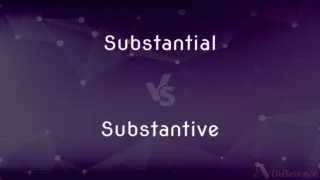Remediate vs. Mitigate — What's the Difference?
By Tayyaba Rehman & Fiza Rafique — Updated on March 7, 2024
Remediation addresses the root cause to eliminate a problem, while mitigation reduces the impact or severity of an event.

Difference Between Remediate and Mitigate
Table of Contents
ADVERTISEMENT
Key Differences
Remediation involves taking steps to fix or correct a problem, often by eliminating the root cause. It is a proactive approach that seeks to resolve issues so they no longer pose a threat. On the other hand, mitigation focuses on reducing the severity or impact of a problem without necessarily addressing its underlying cause. Mitigation is more about managing the consequences.
While remediation aims to solve a problem permanently, mitigation is typically a strategy for dealing with the symptoms or effects of an issue. For example, in environmental cleanup, remediation might involve removing contaminated soil or water to eliminate a pollution source, whereas mitigation could involve creating barriers to prevent the spread of contaminants.
In the context of risk management, remediation might involve patching a software vulnerability to prevent security breaches, signifying a direct approach to eliminate a threat. Conversely, mitigation in this scenario could involve implementing additional security measures, such as firewalls or intrusion detection systems, which do not remove the vulnerability but lessen the potential damage.
Remediation often requires more resources and time initially but can lead to a more sustainable and long-term solution. Mitigation, while possibly quicker and less expensive in the short term, may require ongoing efforts to manage the continuing presence of the problem.
Both strategies can be important in managing risks and issues within various domains, including environmental science, cybersecurity, and public health. Choosing between remediation and mitigation depends on the nature of the problem, available resources, and the desired outcome.
ADVERTISEMENT
Comparison Chart
Objective
Eliminate the root cause
Reduce impact or severity
Approach
Proactive, corrective
Reactive, preventive
Outcome
Long-term solution
Short-term management
Example (Environment)
Removing contaminated soil
Creating barriers to limit spread
Example (Cybersecurity)
Patching a software vulnerability
Implementing firewalls
Compare with Definitions
Remediate
Remediation focuses on resolving issues comprehensively.
The team worked to remediate performance issues in the new application.
Mitigate
Mitigation requires ongoing efforts to manage a problem's presence.
Regular training sessions were introduced to mitigate the risks of workplace accidents.
Remediate
Remediation involves correcting a problem by addressing its root cause.
The company decided to remediate the data breach by upgrading their encryption technology.
Mitigate
Mitigation aims to reduce the severity or impact of a problem.
The city built sea walls to mitigate the effects of storm surges.
Remediate
It seeks to eliminate issues so they no longer pose a threat.
To remediate soil contamination, the polluted earth was excavated and treated.
Mitigate
It involves strategies to manage the consequences of an issue.
To mitigate risk, the company diversified its investment portfolio.
Remediate
Remediation is a direct approach to solve a problem permanently.
The software update was released to remediate known security vulnerabilities.
Mitigate
Mitigation does not necessarily address the root cause of a problem.
Emergency services distributed sandbags to mitigate flooding impacts.
Remediate
It often requires significant resources and time but provides a long-term solution.
Remediation of the old industrial site will prepare it for safe residential use.
Mitigate
It can provide quick and cost-effective management of symptoms.
The software firm implemented extra security layers to mitigate potential data breaches.
Remediate
Provide a remedy for; redress or make right
The most serious flaws are easy to remediate
Mitigate
Make (something bad) less severe, serious, or painful
Drainage schemes have helped to mitigate this problem
Remediate
The act or process of remedying something that is undesirable or deficient
Remediation of the pollution from the factories.
Mitigate
To make less severe or intense; moderate or alleviate.
Remediate
The act or process of providing remedial education
Remediation of poor writing skills in college students.
Mitigate
To make alterations to (land) to make it less polluted or more hospitable to wildlife.
Remediate
(transitive) To correct or improve (a deficiency or problem).
Mitigate
(transitive) To reduce, lessen, or decrease; to make less severe or easier to bear.
Remediate
Intended to correct or improve deficient skills in some subject.
Mitigate
(transitive) To downplay.
Remediate
(obsolete) Remedial.
Mitigate
To make less severe, intense, harsh, rigorous, painful, etc.; to soften; to meliorate; to alleviate; to diminish; to lessen; as, to mitigate heat or cold; to mitigate grief.
Remediate
Remedial.
Mitigate
To make mild and accessible; to mollify; - applied to persons.
This opinion . . . mitigated kings into companions.
Remediate
Set straight or right;
Remedy these deficiencies
Rectify the inequities in salaries
Repair an oversight
Mitigate
Lessen or to try to lessen the seriousness or extent of;
The circumstances extenuate the crime
Mitigate
Make less severe or harsh;
Mitigating circumstances
Common Curiosities
Can remediation and mitigation be used together?
Yes, in many scenarios, both strategies are employed together to address immediate concerns (mitigation) and provide a lasting solution (remediation).
Why choose remediation over mitigation?
Remediation is chosen when a permanent solution is needed to eliminate a problem entirely, although it may require more resources and time initially.
Why is mitigation important?
Mitigation is crucial for managing the impact of a problem quickly and efficiently, especially when immediate solutions are needed or the root cause cannot be easily addressed.
How do remediation and mitigation apply to environmental issues?
In environmental contexts, remediation might involve cleaning up pollutants, while mitigation could involve measures to prevent damage from future incidents, like climate change effects.
What role does mitigation play in risk management?
Mitigation is key in risk management for reducing the potential impact of risks on operations and objectives, often through preventive measures.
What is the main difference between remediate and mitigate?
Remediation focuses on eliminating the root cause of a problem for a long-term solution, while mitigation reduces the severity or impact of an issue without necessarily solving it.
What is an example of remediation in cybersecurity?
An example includes patching software vulnerabilities to prevent exploits and breaches, addressing the root cause of security risks.
How do businesses benefit from mitigation strategies?
Businesses benefit from mitigation by minimizing potential losses and maintaining operational continuity in the face of risks.
How does climate change influence remediation and mitigation strategies?
Climate change necessitates both remediation (e.g., reducing carbon emissions) and mitigation (e.g., adapting infrastructure to withstand extreme weather).
What future trends might affect remediation and mitigation practices?
Future trends include increased reliance on technology for risk assessment and intervention, greater emphasis on sustainability, and evolving regulatory landscapes.
Is remediation always the best approach?
Not always; the choice between remediation and mitigation depends on factors like the nature of the problem, available resources, and the urgency of addressing the issue.
What is an example of mitigation in public health?
Vaccination campaigns to reduce the spread of diseases can be seen as mitigation, reducing the impact of outbreaks without eradicating the disease source.
Can mitigation strategies become permanent solutions?
While mitigation strategies are typically seen as temporary, they can evolve into long-term practices if they effectively manage the issue's impact.
What challenges do organizations face in implementing remediation?
Challenges include identifying the root cause, the high cost and resource requirements, and potential disruption during the remediation process.
How do government policies impact remediation and mitigation efforts?
Government policies can provide guidelines, resources, and incentives for remediation and mitigation efforts, shaping how issues are addressed.
Share Your Discovery

Previous Comparison
Pear vs. Avocado
Next Comparison
Substantial vs. SubstantiveAuthor Spotlight
Written by
Tayyaba RehmanTayyaba Rehman is a distinguished writer, currently serving as a primary contributor to askdifference.com. As a researcher in semantics and etymology, Tayyaba's passion for the complexity of languages and their distinctions has found a perfect home on the platform. Tayyaba delves into the intricacies of language, distinguishing between commonly confused words and phrases, thereby providing clarity for readers worldwide.
Co-written by
Fiza RafiqueFiza Rafique is a skilled content writer at AskDifference.com, where she meticulously refines and enhances written pieces. Drawing from her vast editorial expertise, Fiza ensures clarity, accuracy, and precision in every article. Passionate about language, she continually seeks to elevate the quality of content for readers worldwide.















































